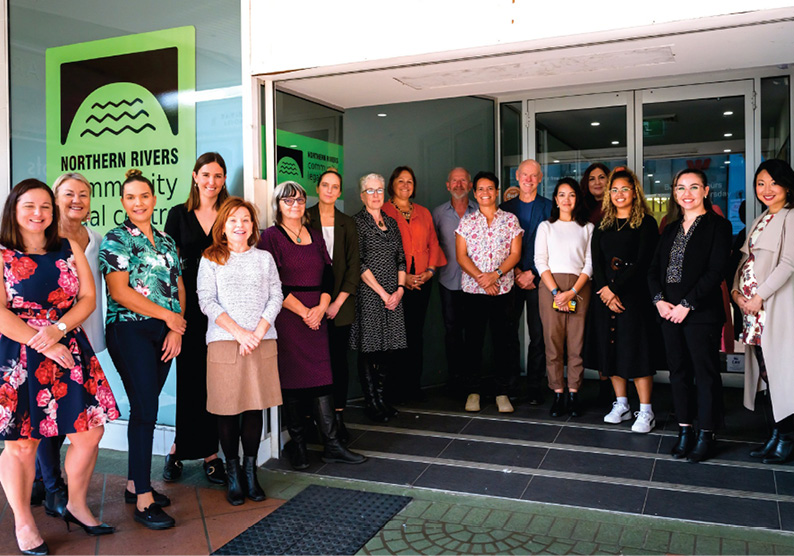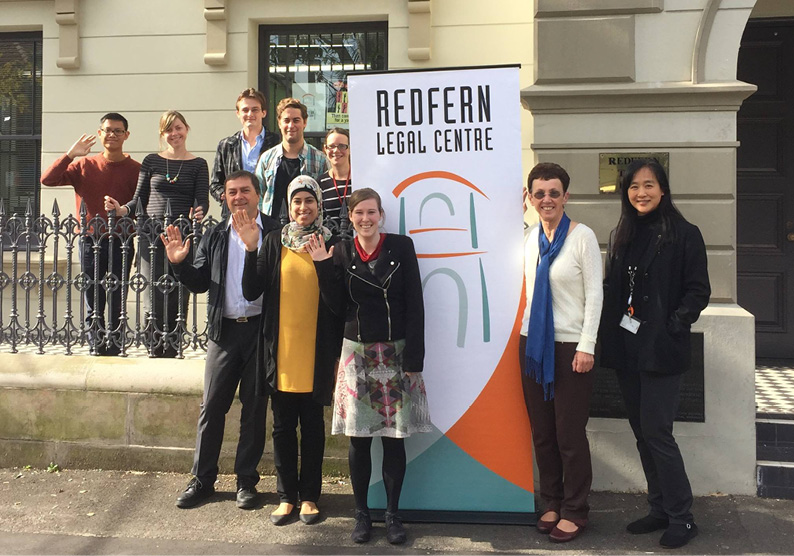We are an agile sector; we are really innovative and can do things without a lot of resources. We need to have the time and money to be able to plan, train staff and look at pro bono.
Recent events such as the 2022 floods, COVID-19 pandemic and 2019-20 bushfire season have caused an unprecedented demand for the legal assistance sector in NSW. Add to that funding shortfalls and a staffing crisis, the sector is fighting an uphill battle but is determined to bounce back stronger.
Almost five months since catastrophic flooding devastated Lismore, the Northern Rivers Community Legal Centre team are only just coming to terms with the sheer scale of the disaster.
The floor height of the Centre’s office once sat at 10.5 metres, but when the flood waters rose above 14 metres into the level above it, everything was lost. Some staff were rescued from their roofs and most were cut off in some way or another.
Now, the team is holed up in one of the town’s only second flood offices that didn’t flood, across the street from their former space. Nicole Jenkins, the Centre Director, is in good spirits as she speaks with LSJ from her makeshift office setup.
“There is 15 of us crammed into three offices. The guy who owns them is a barrister, so we have these massive barrister desks. There is a plastic fold-out table in front of me attached to my desk and up to three people sit there,” Jenkins describes the ordered chaos.
“Rebuilding hasn’t really started. I say that because our town is still an empty shell. There is a lot of movement in town and people coming back. However, most of the shops are still empty and haven’t started the clean-up.
“Not only did we go through a flood at a level that we’ve never experienced before, but we also don’t know what the future holds. We want to be in the CBD because we want to show the community that we are here, and we are here for them.”
Jenkins stresses the word “community” numerous times while speaking about the Centre’s purpose, particularly at a time when the entire area it services (from Tweed, down to Grafton and out to Tabulam) is in a state of upheaval.
After a natural disaster, it’s common for demand for legal assistance to skyrocket. Jenkins says the Centre has had a natural surge in clients coming through needing advice about insurance, tenancy, family law and parenting arrangements and employment.
However, the team has greater concerns for the people “suffering in silence” who have never been “vulnerable” or “at-risk” before.
“We are a community legal centre and I really want to stress that community component. My worry isn’t about the surge, it’s about the people who haven’t even come forward yet,” she says.
“That’s always an issue in a society where people are experiencing disadvantage, or multiple legal issues. If someone doesn’t have insurance – and most people in Lismore were not covered because they couldn’t afford to be – they won’t necessarily come forward because they think there is no legal issue.
“I want to make sure the community understands that we are here long term to support them. We will work with them to work out what their legal issue is instead of having to work it out themselves.”

Disaster mitigation and awareness
The devastation caused by the 2022 floods, compounded by the COVID-19 pandemic and the 2019-20 bushfire season, has driven the community legal sector to consider a more proactive approach to disaster awareness.
Jenkins says what they are experiencing in the Northern Rivers is a “live case study”, and points to the need for a designated disaster recovery team within the sector.
“What we experienced is something I’ve never experienced before and not only was it catastrophic, but we lost all communication. It wasn’t just for a day, it wasn’t just for a night, it was for weeks. And we had no way of even answering calls of clients coming through.
“The sector was asking what we needed. But it wasn’t a question we could answer. It seems like an easy one, but when you are in the middle of a catastrophe, you can’t answer that. We still can’t really answer that. We need to get out in community to work out what the answer is.
“Natural disasters are going to get increasingly like ours that are unpredictable and that are going to make towns inoperable for months. It’s over four months now and we don’t have a CBD.”
Early after the flooding in February, the Northern Rivers CLC received a grant of $680,000 from the NSW Government to support the community on the ground. With that funding, the team is in the process of developing an internal flood recovery team.
“What we learnt from the bushfires is that community want us in the community long-term supporting them. That is our plan,” Jenkins tells LSJ.
“We will set up our own little team with a van. We will make sure we have people with domestic violence experience, legal experience and a social worker, on the road for as long as we can afford, so at least 18 months and if we can stretch that longer then we will.
“I am extremely thankful that we got that money because they trusted us.”
Executive Director of Community Legal Centres NSW Katrina Ironside has been at the helm of the organisation for six weeks and says disaster preparedness will be a key focus during her tenure in the top job.
However, she says that plan is contingent on the surety of long-term funding.
“We are an agile sector; we are really innovative and can do things without a lot of resources. We need to have the time and money to be able to plan, train staff and look at pro bono,” Ironside tells LSJ.
“Nobody has the resources to do that when the flood hits. It needs to be done in advance so that we are ready to go. The funding also needs to be for long enough, to recognise years later people still need assistance. If we can’t do that planning piece, then we are constantly on the back foot.”
 Katrina Ironside, Executive Director CLC NSW
Katrina Ironside, Executive Director CLC NSW
Supply and demand
Ironside isn’t one for “doom and gloom”. From the outset of her conversation with LSJ, her unwavering advocacy and belief in the legal assistance sector (having dedicated the past 25 years of her life to it) is abundantly clear.
But she is staring down numerous roadblocks in the form of unprecedented service demand, funding shortfalls and a crippling staff deficiency.
“Community legal centres are the best places to work. I don’t want to give the wrong impression,” Ironside says.
“Good people are doing great work. If we just had some more wriggle room to think about what we need, and actually plan for it.”
Most CLCs in NSW receive funding from both the Commonwealth and State Governments, although the amounts they receive from each vary. There is no ratio or obvious connection between the amount received from different levels of government.
On 1 July, the NSW Government unveiled its strategy to support the legal assistance sector deliver more than 630,000 legal services each year to vulnerable individuals, families, and communities.
In 2022-23, CLCs will receive more than $35 million as part of the National Legal Assistance Partnership (NLAP) 2020-25, an agreement between the Australian Government and all states and territories for Commonwealth funded legal assistance. This is part of a $450 million investment in the broader legal assistance sector including Legal Aid and the Aboriginal Legal Service.
NSW Attorney General Mark Speakman told LSJ that baseline state funding for CLCs is secure across the remaining life of the NLAP and should provide certainty for the sector the next three years.
“The NSW Government is committed to ensuring ongoing funding decisions are made in a timely, coordinated and sector-informed manner in order to provide financial stability and certainty for the legal assistance sector into the future,” Speakman said.

But Ironside says this commitment hasn’t been “worked out in practical terms”.
“We’ve had no advice about how much will go to Legal Aid and how much will go to CLCs, or how it will be distributed or what their priorities are. We’ve been promised disaster recovery money, we don’t know when that’s coming. There is family law, family violence money. Not sure when that’s coming. How do you plan? How do you retain staff?
“It’s not so much the uncertainty. We’ve had uncertainty before. It’s about: we know this money is supposed to come, when is it coming?”
The NLAP provides Commonwealth funding in a five-year funding cycle from 1 July 2020 to 30 June 2025. The NSW Government moved state funding allocations for CLCs to a three-year funding cycle for 1 July 2019 to 30 June 2022. All state and Commonwealth funding cycles will align on 1 July 2025.
The different funding cycles are causing confusion and uncertainty for some CLCs, including the team at Redfern. CEO Katherine McKernan says the Centre is operating on a 12-month funding contract, creating a “precarious situation” for decision-making about staffing and clients.
“We are in a holding pattern for 12 months with no clarity on the timeframes of those decisions. We could potentially see two parts of our service delivery, if decisions are made soon, really grow and progress in the employment law and family violence space,” McKernan tells LSJ.
“But we don’t have any certainty around that, so we are having to make decisions about staffing and clients in a short-term way because we can’t do any planning and there is no guarantee we’ll get that funding.
“We would really like to see some decisions from the NSW Government around what’s happening with the funding so we have certainty. Then longer term the demand needs to be looked at, as well as how that is actually going to be resourced.”
 Mark Speakman, Attorney General
Mark Speakman, Attorney General
The NSW Government is committed to ensuring ongoing funding decisions are made in a timely, coordinated and sector-informed manner in order to provide financial stability and certainty for the legal assistance sector into the future.
Ongoing sustainability
The tension around funding is being intensified by the heightened demand for services. McKernan says since the start of the pandemic, increasing numbers of clients are coming to Redfern Legal Centre facing great stress and uncertainty.
In the 2020-21 financial year, Redfern Legal Centre saw a 200 per cent increase in the number of referral and information services (3,265 instances) provided by its staff and volunteers at their front desk, and during casework and representation services. This increase is being felt across the board, including in the Centre’s police accountability, employment law and financial abuse teams.
“Even by bolstering our volunteer numbers and securing additional pro bono support, this is a level of demand that is impossible to sustain,” McKernan says.
“The issue is the ongoing sustainability against the demand. We’ve now got higher demand for services and staff without certainty in terms of their jobs in a space where we really need it.
“The demand is here to stay so we need to look at how that is going to be resourced across the legal service system, in particularly the CLC space. Otherwise, we will burn out staff and clients aren’t getting a good a service as they should be.”
Ironside tells LSJ that a great strength of CLCs is the collegiality: people bonded by the shared experience of wanting to make real change. She hopes that with greater certainty around funding, the profession will be able to nurture the young and upcoming lawyers wanting to join the sector.
“We are always struggling with demand, there is no question about that. We never have enough resources, and we live with that,” she says.
“But we are on the ground in community, helping people who need it. You can’t get better than that.”




